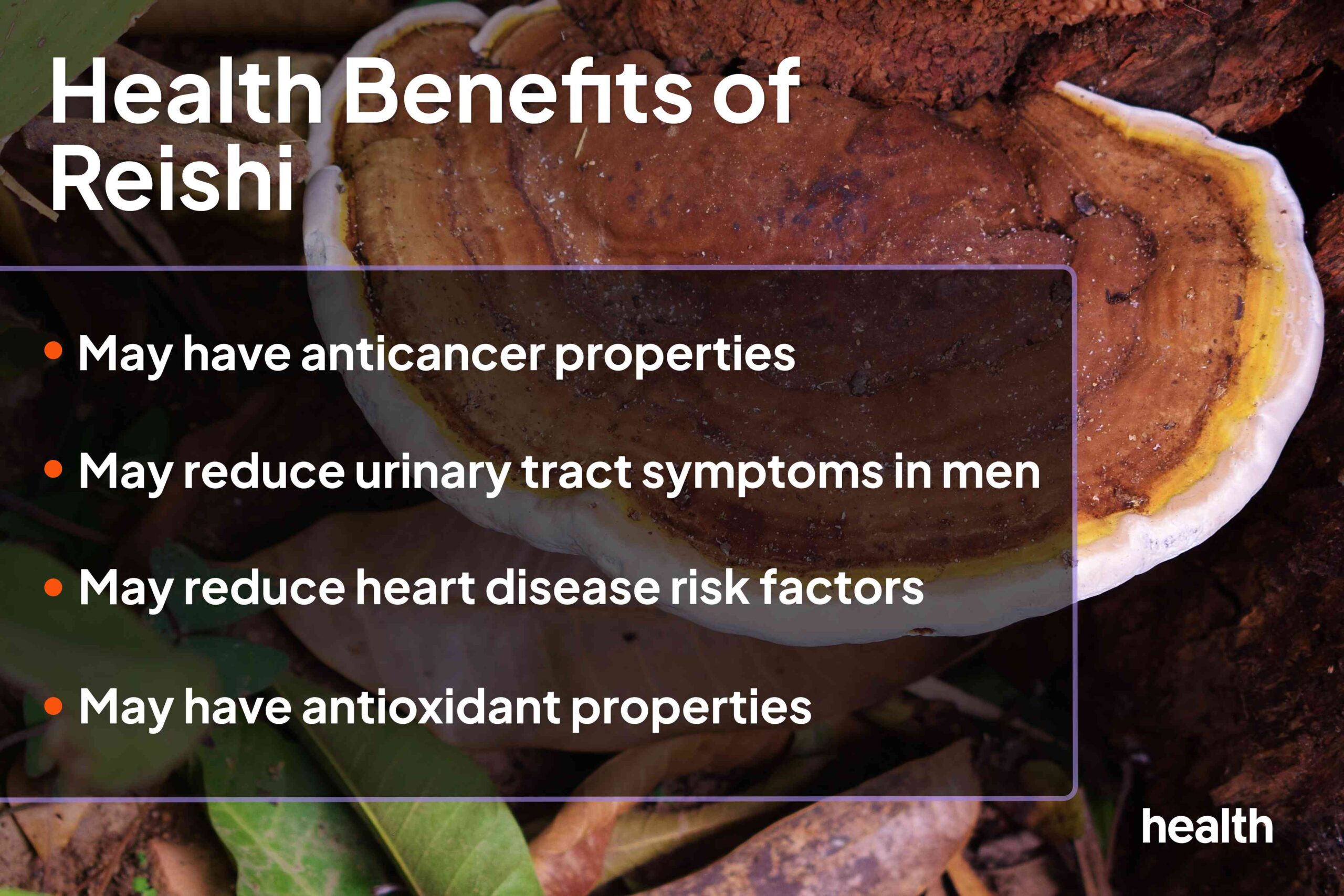
:max_bytes(150000):strip_icc():format(jpeg)/HDC-Text-Overlay-horiz-Purple-Reishi-no-bullets-recirc-21b2e1ae798d49d2b8916ebcf385ad39.jpg)
Reishi (Ganoderma lucidum) is a type of fungus that has been used as a natural medicine in Asian countries such as China, Japan, and Korea for over 2,000 years.
Studies show that reishi contains hundreds of plant compounds, such as polysaccharides, glycoproteins, amino acids, and terpenoids, that positively affect health.
The fungus has been shown to have antioxidant, immune-supportive, and anti-inflammatory properties, and supplementing with this medicinal mushroom may benefit in several ways.
Design by Health / Getty Images
Reishi has long been used in traditional Asian medicine systems for ailments such as cancer and diabetes, but human research investigating the health effects of reishi supplements is limited.
Most of the available research linking reishi to health benefits has been conducted on animals, and many human studies are outdated. More research is needed to assess the effectiveness and safety of reishi supplements in people, especially people with health conditions like cancer.
Limited research suggests that reishi supplements may offer some health benefits.
May Have Anticancer Properties
Reishi is commonly used as a natural treatment for cancer in traditional Chinese medicine (TCM) and other traditional Asian medicine systems.
Some studies suggest that reishi supplements may benefit people with certain types of cancer. However, many of these studies are outdated and completed in Asian populations, so it’s unclear if reishi would have the same effects in non-Asian people with cancer.
Most studies investigating the effects of reishi on cancer also used standardized concentrated extracts of reishi, such as G. lucidum polysaccharides (GLP). These polysaccharides, extracted from reishi, differ from most reishi supplements sold in the United States.
In an older study that included 198 people with colorectal cancer, participants who received 1.5 grams (g) per day of a concentrated reishi extract for 12 months experienced a suppression in the growth of precancerous lesions in their colon. Meanwhile, the participants who received no treatment experienced increased growth of precancerous lesions in their colons.
A few small studies have found that reishi treatment increased blood antioxidant capacity and improved immune response in people with other types of cancer, including breast and lung cancer.
Reishi contains compounds such as beta-glucans and polysaccharides, which have antitumor and immune-stimulating properties. Some of these compounds, like GLP, may increase the body’s ability to fight cancer by improving the action of immune cells, like natural killer (NK) cells, against various types of cancers.
While these results are promising, more research is needed to understand how treatment with different reishi products may help people with cancer.
May Reduce Urinary Tract Symptoms in Men
Limited research suggests that reishi may be helpful for men with lower urinary tract symptoms (LUTS). LUTS refers to urinary symptoms like urinary retention, incomplete bladder emptying, and a weak urine stream. LUTS is most commonly caused by benign prostatic hyperplasia (BPH), a medical condition that causes a non-cancerous enlargement of the prostate.
Due to its anti-inflammatory effects, reishi may help reduce LUTS. For example:
- An older study that included 50 men with LUTS found that the men treated with daily doses of 6 milligrams (mg) and 60 mg of reishi extract for eight weeks experienced significant reductions in LUTS symptoms compared to a placebo group.
- Another study from the same researchers in the same year found that treatment with 6 mg of reishi extract per day for 12 weeks significantly improved LUTS symptoms compared to a placebo treatment.
Though these findings are encouraging, more studies are needed to confirm these potential benefits.
Other Potential Benefits
Reishi has been promoted as a natural way to reduce heart disease risk factors like high levels of triglycerides, blood sugar, and cholesterol. While a few older studies found that reishi was effective for lowering these risk factors, more recent studies have found reishi to be ineffective.
For example, a study that included 84 people with type 2 diabetes found that treatment with 3 g of reishi extract per day for 16 weeks had no effect on the blood sugar control marker hemoglobin A1c (HbA1c) or fasting blood sugar compared to a placebo.
While many studies conducted in animals have shown that reishi has powerful anti-inflammatory, antioxidant, and cognitive health-supporting properties, there’s not enough human evidence to confirm these potential benefits.
Reishi is a large, dark-colored mushroom with a glossy surface. It most commonly grows on the bases and stumps of deciduous trees, such as maple, elm, oak, willow, and locust trees, in temperate regions of Europe, Asia, and North and South America.
Reishi supplements are available in many forms, including capsules, liquids, and powders. In addition to supplements, reishi is available in tea form and used in food products, like energy bars, coffee creamers, and more.
While reishi-only supplements are available, reishi is often combined with other ingredients, like medicinal mushrooms and herbs, so it’s important to read supplement ingredient labels.
Dosage
The dose of reishi depends on its form. Doses of reishi mushroom typically range from 1,400-5,400 mg daily, while reishi extracts are taken in smaller doses, such as 3-6 mg. Reishi supplements are usually taken in divided doses.
Dosing recommendations vary, so it’s best to check with a healthcare provider before supplementing with reishi.
Studies show that reishi mushroom supplements sold in the U.S. have inconsistent dosing and may not contain the amount of reishi stated on the label. Look for products that have been third-party tested for quality, accuracy, and safety.
Reishi is generally considered safe when used in recommended doses for up to one year. Studies show that reishi products, like reishi extract, are generally well-tolerated and not associated with adverse health risks.
However, some research suggests that high doses of reishi extract may increase levels of the tumor marker CA72-4. For this reason, it’s critical to speak with your healthcare provider before taking reishi supplements, especially if you have cancer.
In rare cases, people taking reishi supplements for two months or more have experienced abnormal growths in the liver, liver toxicity, and liver failure. However, these were individual cases that may have had other health factors at play.
There’s not enough evidence to show if reishi is safe to use during pregnancy and breastfeeding, so it’s best to avoid reishi supplements during this time.
Potential Drug Interactions
Reishi has the potential to interact with some commonly prescribed medications, such as:
- Anticoagulants: Reishi may increase the risk of bleeding in people taking blood thinners, like Coumadin (warfarin).
- Immunosuppressants: Because reishi has been shown to influence the immune system, it may interact with immunosuppressant medications.
- Cancer medications: Reishi may interact with the chemotherapy drugs, so you should avoid taking reishi if you’re undergoing chemotherapy unless it’s recommended and monitored by your healthcare provider.
In addition to the medications listed above, reishi may interact with other drugs, such as those used to treat high blood sugar and high blood pressure. If you’re interested in taking reishi and are taking one or more medications, you should consult your healthcare provider to ensure it’s a safe choice for your specific health needs.
Can You Take Too Much
There isn’t enough information to recommend an upper limit for reishi, and it’s unknown if large doses of reishi are safe to take, especially for long periods.
Follow the recommended doses on supplement labels to avoid potential health risks associated with taking large amounts of reishi. Contact your healthcare provider for advice if you have questions about safe dosing.
Reishi supplements aren’t associated with serious health concerns, but some studies have reported mild side effects, including:
- Stomach discomfort
- Dizziness
- Nausea
- Fatigue
- Insomnia
- Rash
- Dry mouth
- Sore throat
If you experience any of these symptoms after supplementing with reishi, stop taking the supplement and contact your healthcare provider if your symptoms don’t improve.
Reishi is a medicinal mushroom that’s been used as a natural remedy for thousands of years.
While reishi has been promoted as an alternative treatment for certain cancers, urinary symptoms, and high blood sugar, human research is limited and there’s not enough evidence to recommend reishi as a supplement for any health condition.
If you’re interested in using reishi supplements, it’s important to speak with a qualified healthcare provider to ensure that reishi is a safe and appropriate choice for your health needs.








